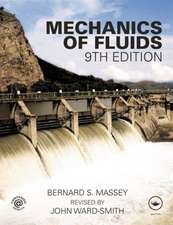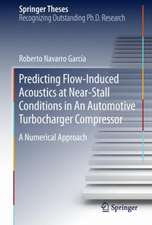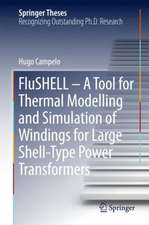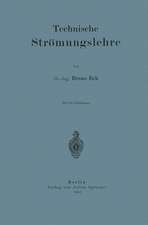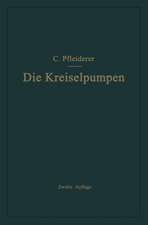Handbook of Multiphase Flow Science and Technology: Handbook of Multiphase Flow Science and Technology
Editat de Guan Heng Yeoh, Jyeshtharaj B. Joshien Limba Engleză Hardback – 27 sep 2023
The Handbook consists of three parts or volumes:
1. Theory: describes the fundamentals including the concepts and definitions of multiphase flows. Classifications of multiphase flows. Basic understanding of different length scales involved – micro/nano, meso and macro. Treatment of such flows by different solution frameworks.
2. Modelling and Measurement: covers both classical and state-of the-art measurement and modelling approaches to resolve different classifications of multiphase flows.
3. Applications: highlights the very latest applications of measurement and modelling approaches in tackling different classification of multiphase flows in a variety of natural, biological and industrial systems and different length scales.
Preț: 5299.82 lei
Preț vechi: 6463.20 lei
-18% Nou
Puncte Express: 7950
Preț estimativ în valută:
1014.09€ • 1058.81$ • 839.31£
1014.09€ • 1058.81$ • 839.31£
Carte disponibilă
Livrare economică 14-28 martie
Preluare comenzi: 021 569.72.76
Specificații
ISBN-13: 9789812870919
ISBN-10: 9812870911
Pagini: 1200
Ilustrații: XXVII, 1634 p. 581 illus., 427 illus. in color. In 2 volumes, not available separately.
Dimensiuni: 155 x 235 mm
Greutate: 3.52 kg
Ediția:1st ed. 2023
Editura: Springer Nature Singapore
Colecția Springer
Seria Handbook of Multiphase Flow Science and Technology
Locul publicării:Singapore, Singapore
ISBN-10: 9812870911
Pagini: 1200
Ilustrații: XXVII, 1634 p. 581 illus., 427 illus. in color. In 2 volumes, not available separately.
Dimensiuni: 155 x 235 mm
Greutate: 3.52 kg
Ediția:1st ed. 2023
Editura: Springer Nature Singapore
Colecția Springer
Seria Handbook of Multiphase Flow Science and Technology
Locul publicării:Singapore, Singapore
Public țintă
ResearchCuprins
Fundamental Theory of Multiphase Flows.- Basic Theory and Conceptual Framework of Multiphase Flows.- Turbulence in Multiphase Flows.- Review of Subcooled Boiling Flow Models.- -Multiphase Flow Measurements using PIV and LIF.- Theoretical/Computational Multiphase Flows.- -Recent Advances in Modelling Gas-Liquid Flows.- Euler-Euler-Modelling of Poly-dispersed Bubbly Flows.- Euler-Euler-Modelling of Segregated Flows and Flows with Transitions Between Different Flow Morphologies.- Recent Advances in Modelling Subcooled Boiling Flows.- Computational Simulations of Microbubbles.- Recent Advances in Modelling Gas-Particle Flows.- Numerical Modelling of Pulverised Coal Combustion.- Challenges in Modelling Sprays in Internal Combustion Engine.- Recent Advances in DEM Modelling.- Experimental Multiphase Flows.- Flooding Phenomenon of Cyrogenic Liquids.- Cavitating Flow of Cyrogenic Fluids.- Imaging Measuring Techniques.- TOPFLOW-Experiments in Vertical Pipes.- Applications of Multiphase Flows.- Multiphase Flows in Biomedical Applications.- Flow Boiling Enhancement via Cross-Sectional Expansion.- Slug Flow Heat Transfer in Microchannels.- Nanoparticle/Liquid Flow Applications.- Multiphase Flows in Pharmaceutical Applications.
Notă biografică
Dr Guan Heng received his Ph.D. in 1993 from UNSW Sydney. He is a renowned expert in multiphase flows and has published a book titled Computational Techniques for Multi-Phase Flows: Basics and Applications, which has been widely read and cited extensively. He has also published other notable works including the highly cited book titled Computational Fluid Dynamics: A Practical Approach. In recognition of his pioneering development and application of innovative computational models across a diverse range of engineering fields, he is currently the Directors of two major centres in Australia fire safety engineering landscape: Australian Research Council Training Centre for Fire Retardant Materials and Safety Technologies and Australian Research Council Research Hub for Fire Resilience Infrastructure, Assets and Safety Advancements. He manages significant industry focused fire research projects including the development of carbon materials, green and durable polymer composites, next generation fire suppression technologies, rapid responsive sensors and early detection systems, and new flammability tests for compliance with fire safety regulatory standards. He has received two significant awards: Brennan Medal for the best book publication from the Institute of Chemical Engineers (IChemE) Award in 2009 and NASA Award on novel research work in solidification in microgravity environment in 1992.
Prof Jyeshtharaj Bhalchandra Joshi is Emeritus Professor of Eminence at the Institute of Chemical Technology (ICT), Mumbai, India. Born on May 28, 1949, Joshi obtained Bachelor (1972) and Doctorate (1977) degrees in Chemical Engineering from the University of Mumbai. He joined the faculty in 1972 in the then University Department of Chemical Technology (UDCT, now ICT) and held the position of Director during 1999-2009. He has published more than 600 papers in international journals, with more than 25,000 citations, has guided 100 Ph.D.s, 60 Masters and 20 Post-doctoral students.Prof. Joshi has several major contributions to his credit. He has developed in-house codes for computational fluid dynamics for multiphase dispersions and complex geometries. These codes have many superior features of the physics of fluid motion. He has made detailed flow/ temperature/ Concentration measurements and developed techniques for the quantification of multiphase flow. Using these first two steps and using the mathematical tools he has been able to characterise the turbulence in large number of Chemical Process Equipment. He has developed relationship between the flow patterns and the design parameters of multiphase reactors. A unique blend of theory, modelling, experiments and intuition has resulted in a rational basis for the design, scale-up and implementation of a large number of commercial size multiphase reactors (having substantially reduced capital and operating costs) in India and throughout the World. Joshi has analysed probably the most complex case of multiphase reactions, namely the absorption of nitrogen oxides (NOx) in water, alkaline and acidic solutions. Joshi (together with colleagues) have solved several problems of the society concomitantly increasing per capita income of the poor. Joshi has been very active in promoting science awareness and the scientific temper of the society. He has generated research excitement in young generation by holding about 200 workshops and 100,000 participants per year. Joshi succeeded admirably as the Director of Institute of Chemical Technology (1999-2009) in the formidable task of converting the University Department to Autonomous University Institution and finally to University. During his tenure all the academic parameters increased by factor of at least two (number of international publications, citations per year, number of Ph.D. admissions per year). As a consequence, the Institution ranked among top ten in the World. He was also responsible for phenomenal growth in external revenue generation (ERG) with compounded growth of 25% per year through research contracts, consultancy projects and donations. In 2009, such ERG was almost ten times the Government Grant (to ICT ), perhaps the highest ratio among state funded institutions. Joshi is the recipient of numerous awards and honours. Notable among them are: Shantiswarup Bhatnagar Prize for Engineering Sciences, Fellow of Indian Academy of sciences (FASC), Indian National Science Academy (FNA), the World Academy of Sciences (FTWAS) and International Member of the US National Academy of Engineering. He is also recipient of a Civilian Award Padma Bhushan from the President of India.
Textul de pe ultima copertă
This Handbook provides readers with the current cutting edge of multiphase flow technology. It reviews the rapid development of multiphase flow technology, demonstrates the latest development of the technology, and showcase the very latest applications. It provides readers with comprehensive updated reference information covering theory, modelling and numerical methods, design and measurement, and new applications in multiphase flow systems.
The Handbook consists of three parts or volumes:
1. Theory: describes the fundamentals including the concepts and definitions of multiphase flows. Classifications of multiphase flows. Basic understanding of different length scales involved – micro/nano, meso and macro. Treatment of such flows by different solution frameworks.
2. Modelling and Measurement: covers both classical and state-of the-art measurement and modelling approaches to resolve different classifications of multiphase flows.
3. Applications: highlights the very latest applications of measurement and modelling approaches in tackling different classification of multiphase flows in a variety of natural, biological and industrial systems and different length scales.
The Handbook consists of three parts or volumes:
1. Theory: describes the fundamentals including the concepts and definitions of multiphase flows. Classifications of multiphase flows. Basic understanding of different length scales involved – micro/nano, meso and macro. Treatment of such flows by different solution frameworks.
2. Modelling and Measurement: covers both classical and state-of the-art measurement and modelling approaches to resolve different classifications of multiphase flows.
3. Applications: highlights the very latest applications of measurement and modelling approaches in tackling different classification of multiphase flows in a variety of natural, biological and industrial systems and different length scales.
Caracteristici
Reviews the rapid development and latest applications of multiphase flow technology Serves as a full technical reference with a comprehensive view of the technology Widely covers all key design and also fundamental issues related to multiphase flows


